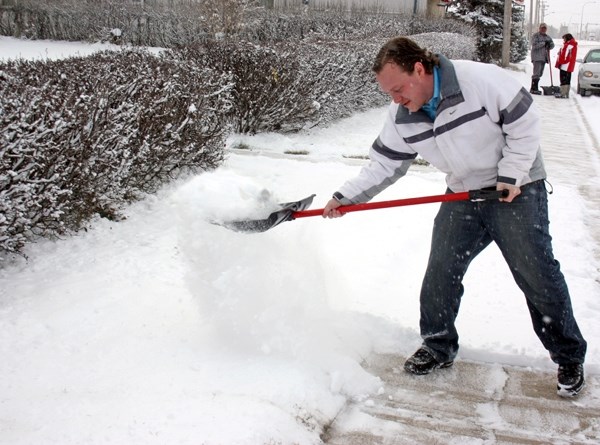While the town has responsibilities with respect to clearing snow off the streets, it must not be forgotten that ordinary citizens have several duties of their own to fulfill.
The town’s Snow Removal Bylaw (2004-23) addresses some of residents’ responsibilities, as it outlines how long after a snowfall property owners and occupants have to clear the sidewalks in front of their properties.
For residential properties, the snow must be cleared within 48 hours of the end of the snowfall, said town peace officer John Morrison.
For non-residential properties, the time given to clear the snow is cut in half, to only 24 hours, he said.
Enforcement of this bylaw can be done either proactively, by travelling the streets looking for snow-covered sidewalks, or reactively, by responding to complaints by neighbours or other citizens.
Morrison said he will enforce the bylaw both ways depending on the situation.
“Complaints that come in, I act on immediately,” he said. “If you were to ring up and say, ‘Hey, my neighbour hasn’t shovelled his walk and I almost slipped over,’ or someone walks past a business and says, ‘I was walking downtown and I almost slipped over and fell because they haven’t shovelled their walk or there’s ice everywhere, can you do something about it?’ I would go out.”
He will also be proactive in enforcing the bylaw if he is out on another call and sees a property that needs to be cleared. In this case, he would leave a reminder notice for the occupant, which in effect says, “Hey, you know what, you’re supposed to clear your walk within 48 hours.”
Generally, when he returns to check on the progress two days later, the sidewalk will have been cleared, he said. However, there are times when nothing will have changed.
At that point, he has the option of delivering an enforcement order, which essentially states, “You WILL clean your sidewalk within 24 hours or I’m going to issue you a ticket.”
Although he said he prefers not to hand out tickets, Morrison will do so if no other avenues of compliance have worked.
For residential properties, the tickets start at $50 for the first offence, and $100 for each subsequent offence. For non-residential properties, the fines double to $100 for a first offence and $200 for each one thereafter.
A final method of getting the sidewalk cleared available to Morrison and the town is to have the town come and clear the sidewalk itself and then add the cost to the occupant’s next property tax bill. This practice can be done in conjunction with, or separate from, issuing a ticket, Morrison said.
For all the emphasis placed on the occupant to clear the snow, Morrison does acknowledge it may simply be that an occupant is ignorant of his or her responsibilities if he or she is new to the town.
He cited residents from the rural community, who did not need to clear their walks before, do not know they must do so.
Morrison also said it’s important people know where they can dump the snow they have cleared from their sidewalks.
Snow is not to be dumped onto the road, but instead must be piled onto the property itself.
This serves two purposes, he said. One, it prevents cars getting stuck in the snow, which would often get too deep if people dump their snow on the road. And two, it can help keep your lawn green in the summer, as the extra snow will melt in the spring and further hydrate the lawn.
There are obvious exceptions to these rules, however. Morrison said businesses in the downtown can push their snow out onto the road within 24 hours, where it will be cleared away when the town comes around to clear the streets.
As the town does not clear the sidewalks itself, it is incumbent on residents to do their part and clear the way and make living and walking in Westlock safer.



